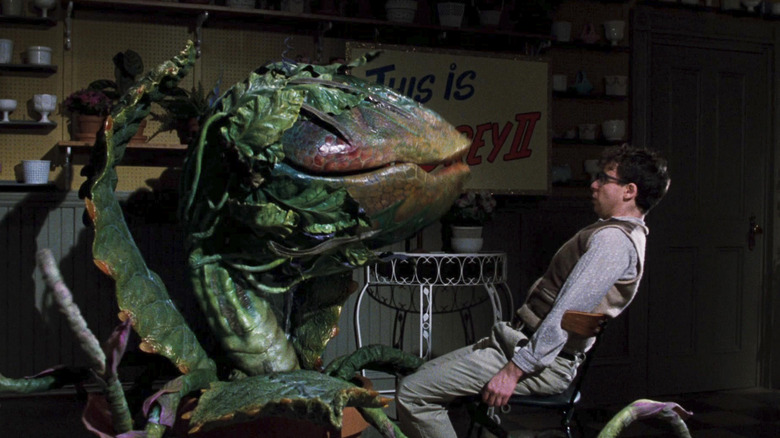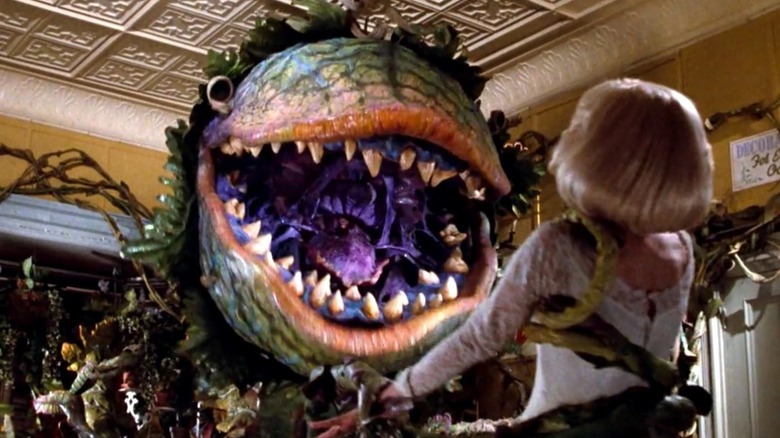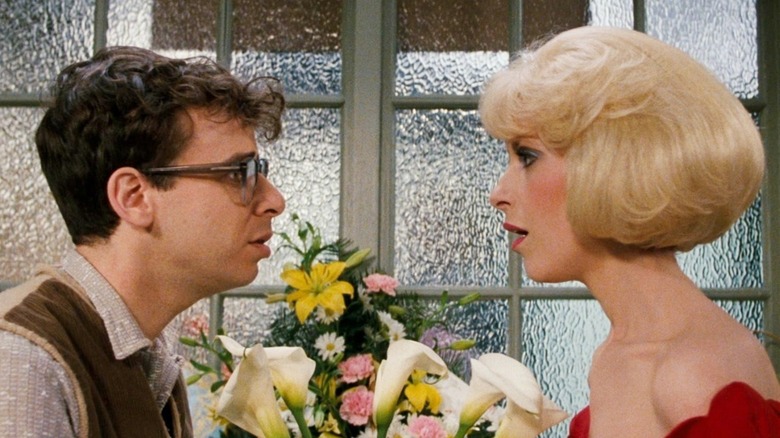Frank Oz Is Still Stunned By The Staying Power Of Little Shop Of Horrors
People today spend a lot of time complaining about the amount of remakes in Hollywood, and for good reason. If nobody in the entertainment industry is willing to take a chance on new ideas anymore, eventually we'll simply run out of things to reboot and achieve full cultural bankruptcy.
Sometimes, however, a remake is necessary to perfect a story's formula. For example, back in the '80s, Frank Oz made a movie based on an off-Broadway musical based on an even older movie, and it was excellent. This movie was "Little Shop of Horrors," a cult classic whose unique combination of horror, comedy, and catchy songs has proven it can stand the test of time.
The movie focuses on a mild-mannered plant shop owner who discovers a sentient, carnivorous plant that feasts on human flesh, which he of course names after his crush, Audrey. The off-beat musical was instantly a hit with reviewers of its time, with Roger Ebert himself predicting the future by calling it "the kind of movie cults are made of."
Even to this day, the film has received accolade upon accolade, with a screening of the movie with its alternate ending being included in the New York Film Festival's "Masterwork" lineup. With the near-universal praise the film has received from critics and audiences alike for decades, it's no wonder that director Frank Oz, best known for his work performing as multiple Muppets, remains stunned by the film's amazing staying power.
Lasting influence
The massive success of "Little Shop of Horrors" wasn't always a given, however. The movie wields its own weirdness like a powerful ax, happily chopping away at audience expectations and musical conventions just like Seymour chopped away at Orin the evil dentist in the film. The story was so weird, however, that even Oz had trouble understanding the pitch for it at first, which he says he initially turned down because he "couldn't get [his] hands around it." While Oz ultimately had a change of heart after mulling the idea over, he surely didn't expect such an odd film to achieve what it has.
While the movie's box office numbers were paltry, at best, earning $39 million off a $25 million budget, it soon fulfilled Ebert's prophecy and gained a large cult following. To this day, you can see many live theater productions of the show.
The film isn't only replicated on stage — it has become the subject of references all over pop culture. Even if you haven't seen "Little Shop of Horrors," you've definitely encountered its fingerprints in other media, from the derogatory name for the gifted student class in "Malcolm in the Middle" being "Krelboynes" after the film's main character, Seymour, to being the namesake for a level in the "Monster Hunter" video game series where you fight man-eating plants, to being the subject of multiple "Family Guy" cutaways.
Trusting his instincts
Oz expressed his disbelief at the movie's lasting success in a Hollywood Reporter 35th anniversary piece about the movie from 2021 (funnily enough, having a lengthy piece about the history of your film written 35 years after its release is another indicator of its cultural impact):
"I am thrilled by the popularity. You do something, and you don't think about the longevity. You put your heart and soul to make it the best you can. Then it is up to the marketing gods and the audience gods. One never knows. I am very fortunate and proud my instincts — outside the original ending — created something more enduring than I realized."
The original ending Oz refers to, of course, is one in which the movie's two protagonists are eaten by the villainous plant, which then propagates and begins to take over the world. This rather bleak ending was received poorly by test audiences, but it's once again a testament to Oz's instincts that he was completely willing to change things for the good of the movie. These instincts, which also helped the movie achieve its perfectly balanced tone between goofiness and self-awareness, are a huge part of why the movie has stood the test of time. And with songs as catchy as "Suddenly, Seymour" and "Mean Green Mother from Outer Space," audiences still can't get it out of their heads all these years later.


